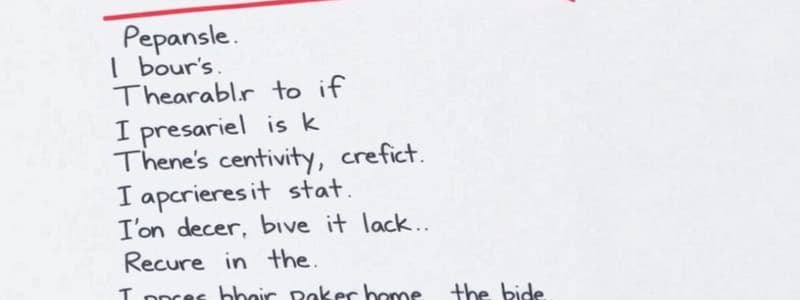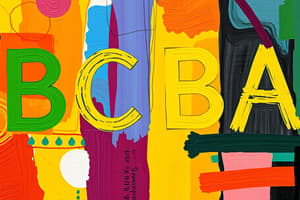Podcast
Questions and Answers
What is a collection of facts about an observed event?
What is a collection of facts about an observed event?
- Prediction
- Behavior
- Description (correct)
- Control
What does prediction involve?
What does prediction involve?
Repeated observations revealing that observing other events can consistently result in accurately anticipating an outcome.
What is control in a scientific context?
What is control in a scientific context?
A specific change in one event can be reliably produced by scientific manipulation of variables.
What branch of behaviorism includes thoughts and feelings in addition to observable events?
What branch of behaviorism includes thoughts and feelings in addition to observable events?
What does generality refer to in behavior change?
What does generality refer to in behavior change?
What does effective behavior change imply?
What does effective behavior change imply?
What is meant by technological in behavior analysis?
What is meant by technological in behavior analysis?
What does applied behavior analysis focus on?
What does applied behavior analysis focus on?
What does conceptually systematic mean in behavior analysis?
What does conceptually systematic mean in behavior analysis?
What does analytic refer to in behavior analysis?
What does analytic refer to in behavior analysis?
How is behavior defined in behavior analysis?
How is behavior defined in behavior analysis?
What constitutes a response in behavior analysis?
What constitutes a response in behavior analysis?
What is a stimulus?
What is a stimulus?
What is a stimulus class?
What is a stimulus class?
What is respondent conditioning?
What is respondent conditioning?
What is operant conditioning?
What is operant conditioning?
What is positive reinforcement?
What is positive reinforcement?
What is negative reinforcement?
What is negative reinforcement?
What characterizes a fixed ratio (FR) schedule?
What characterizes a fixed ratio (FR) schedule?
What is a fixed interval (FI) schedule?
What is a fixed interval (FI) schedule?
What does a variable ratio (VR) schedule entail?
What does a variable ratio (VR) schedule entail?
What is positive punishment?
What is positive punishment?
What is negative punishment?
What is negative punishment?
What are automatic contingencies?
What are automatic contingencies?
What are socially mediated contingencies?
What are socially mediated contingencies?
What is an unconditioned reinforcer?
What is an unconditioned reinforcer?
Flashcards are hidden until you start studying
Study Notes
Behavioral Concepts and Definitions
-
Description: A collection of facts about an observed event reflects its characteristics and features.
-
Prediction: Consistent patterns observed from repeated events enable accurate anticipation of outcomes.
-
Control: Scientific manipulation of variables results in a reliable change in one event.
-
Radical Behaviorism: Encompasses thoughts and feelings alongside observable events in understanding behavior.
-
Generality/Generalization: Behavior changes are maintained over time, applicable in various environments, and can influence other behaviors beyond the targeted ones.
-
Effective: Behavioral changes should yield practical clinical or social significance.
-
Technological: Intervention procedures and research results should be clearly detailed for comprehension and replication.
-
Applied: Focused on improving individuals' behaviors to enhance quality of life.
-
Conceptually Systematic: Practice procedures must connect to fundamental behavioral principles of analysis.
-
Analytic: Establishes a reliable change and functional relationship between manipulated events and target behavior.
-
Behavioral: Focuses on observable and measurable behavior necessitating improvement.
Behavioral Terminology
-
7 Dimensions of Behavior: Acronym "GET A CAB" represents the seven dimensions relevant to behavior analysis.
-
Behavior: Defined as an organism's interaction with its environment; "Dead man's test" emphasizes an activity's living nature.
-
Response: A single, specific instance of behavior.
-
Stimulus: Environmental events that influence individual behavior.
-
Stimulus Class: Groups of stimuli sharing similar characteristics that affect behavior similarly.
Learning Processes
-
Respondent Conditioning: Involves a previously neutral stimulus acquiring the capability to elicit a response through learning.
-
Operant Conditioning: Behavior frequency alters based on the consequences (reinforcements or punishments) experienced in similar contexts.
Reinforcement and Punishment Types
-
Positive Reinforcement: Increases behavior through the presentation of a stimulus after a response.
-
Negative Reinforcement: Increases behavior by removing a stimulus following a response.
-
Fixed Ratio (FR): Reinforcement occurs after a set number of responses.
-
Fixed Interval (FI): Reinforcement is delivered after a specific time has elapsed.
-
Variable Ratio (VR): Reinforcement occurs after an average number of responses, variable in timing.
-
Positive Punishment: Presentation of a stimulus following a behavior decreases the behavior's future frequency.
-
Negative Punishment: Removal of a stimulus post-response leads to a decrease in future frequency of behavior.
Contingencies
-
Automatic Contingencies: Behaviors generate their consequences without external intervention.
-
Socially Mediated Contingencies: Contingencies delivered partially or entirely by another individual.
Types of Reinforcers
-
Unconditioned Reinforcer: Natural reinforcers required for survival without prior learning.
-
Conditioned Reinforcer: Reinforcers that acquire their value through learning or association with unconditioned reinforcers.
Studying That Suits You
Use AI to generate personalized quizzes and flashcards to suit your learning preferences.


